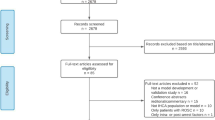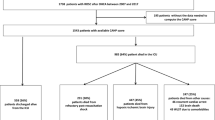Abstract
Objective: To better clarify patient factors that predict survival from in-hospital cardiopulmonary resuscitation (CPR), using two methods: 1) meta-analysis and 2) validation of a prediction model, the pre-arrest morbidity (PAM) index.
Design: Meta-analysis of previously published studies by standard techniques. Retrospective chart review of validation sample.
Setting: University-affiliated teaching hospital.
Patients/participants: Meta-analytic sample of 21 previous studies from 1965–1989. The validation sample consisted of all patients surviving resuscitation from the authors’ hospital during the period September 1986 to January 1991. A matched sample of patients who did not survive from the same time period was used as the comparison group.
Interventions: None.
Measurements and main results: The strongest negative predictors of survival, by meta-analysis, were renal failure (r=0.088, p<0.0002), cancer (r=0.08, p<0.0002), and age more than 60 years (r=0.063, p<0.006). Sepsis (r=0.046, p<0.02), recent cerebrovascular accident (CVA) (r=0.038, p<0.04), and congestive heart failure (CHF) class III/IV (r=0.036, p<0.05) were weaker negative predictors. Presence of acute myocardial infarction (AMI) was a significant positive predictor of survival (r=0.15, p<0.0001). The PAM score was highly predictive of survival in a logistic regression model (p<0.0003, R2=9.6%). No patient who survived to discharge had a PAM score higher than 8.
Conclusion: Meta-analysis reveals that the most significant negative predictors of survival from CPR are renal failure, cancer, and age more than 60 years, while AMI is a significant positive predictor. The PAM index is a useful method of stratifying probability of survival from CPR, especially for those patients with high PAM scores, who have essentially no chance of survival.
Similar content being viewed by others
References
Kouwenhoven WB, Jude JR, Knickerbocker GG. Closed-chest cardiac massage. JAMA. 1960;173:1064–7.
Jonsson PV, McNamee M, Campion EW. The “do not resuscitate” order: a profile of its changing use. Arch Intern Med. 1988;148:2373–5.
Gleeson K. The do-not-resuscitate order: still too little too late. Arch Intern Med. 1990;150:1057–60.
Younger SJ. Who defines futility? JAMA. 1988;260:2094–5.
Ebell MH, Doukas DJ, Smith MA. The do-not-resuscitate order: a comparison of physician and patient preferences and decision-making. Am J Med. 1991;91:255–60.
Lo B, Steinbrook RL. Deciding whether to resuscitate. Arch Intern Med. 1983;143:1561–3.
Miles SH, Cranford R, Schultz AL. The do-not-resuscitate order in a teaching hospital: considerations and a suggested policy. Ann Intern Med. 1982;96:660–4.
McClung JA, Kamer RS. Implications of New York’s do-not-resuscitate law. N Engl J Med. 1990;323:270–2.
Emanuel IX, Barry MJ, Stoeckle JD, Nelson LM. Advance directives in medical care—a case for greater use. N Engl J Med. 1991;324:889–95.
Kyff J, Puri VK, Raheja R, Ireland T. Cardiopulmonary resuscitation in hospitalized patients: continuing problems of decision-making. Crit Care Med. 1987;15:41–3.
Niskanen M, Kori A, Nikki P, et al. Acute physiology and chronic health evaluation (APACHE II) and Glasgow coma scores as predictors of outcome from intensive care after cardiac arrest. Crit Care Med. 1991;19:1465–73.
Marwick TH, Case CC, Siskind V, Woodhouse SP. Prediction of survival from resuscitation: a prognostic index derived from multivariate logistic model analysis. Resuscitation. 1991;22:129–37.
Iacovelli W, Alaimo M, Salvadori A, Merqoni M. Survival of 213 patients who recovered in resuscitation from cardiac arrest. Minerva Anestesiol 1991;57:341–8.
Peschin A, Coakley CS. A five year review of 734 cardiopulmonary arrests. South Med J. 1970;63:506–10.
Wagner A. Cardiopulmonary resuscitation in the aged: a prospective study. N Engl J Med. 1984;310:1129–30.
Camarata SJ, Weil MH, Hanashiro PK, Shubin H. Cardiac arrest in the critically ill. I. A study of predisposing causes in 132 patients. Circulation. 1971;44:688–95.
Wachter RM, Luce JM, Hearst, LO B. Decisions about resuscitation: inequities among patients with different diseases but similar prognoses. Ann Intern Med. 1989;111:525–32.
Suljaga-Pechtel K, Goldberg E, Strickon P, Berger M, Skovron ML. Cardiopulmonary resuscitation in a hospitalized population: prospective study of factors associated with outcome. Resuscitation. 1984;12:77–95.
DeBard ML. Cardiopulmonary resuscitation: analysis of six-years’ experience and review of the literature. Ann Emerg Med. 1981;10:408–16.
Taffet GE, Teasdale TA, Luchi RJ. In-hospital cardiopulmonary resuscitation. JAMA. 1988;260:2069–72.
Saphir R. External cardiac massage: prospective analysis of 123 cases and review of the literature. Medicine. 1968;47:73–87.
Scaff B, Munson R, Hastings DF. Cardiopulmonary resuscitation at a community hospital with a family practice residency. J Fam Pract. 1984;18:561–5.
Hollingsworth JH. The results of cardiopulmonary resuscitation: a 3-year university hospital experience. Ann Intern Med. 1969;71:459–66.
Urberg M, Ways C. Survival after cardiopulmonary resuscitation for an in-hospital cardiac arrest. J Fam Pract. 1987;25:41–4.
Broadhurst C, Peretz DI, Johnson AL. Cardiac resuscitation in 126 medical patients using external cardiac massage. Lancet. 1963;i:1290–2.
Castagna J, Weil MH, Shubin H. Factors determining survival in patients with cardiac arrest. Chest. 1974;65:527–9.
Tweed WA, Bristow G, Donen N, Kirk BW. Evaluation of hospital-based cardiac resuscitation, 1973–77. Can Med Assoc J. 1980;122:301–304.
Stemmler EJ. Cardiac resuscitation: a 1-year study of patients resuscitated within a university hospital. Ann Intern Med. 1965;63:613–8.
Sowden GR, Robins DW, Baskett. Factors associated with survival and eventual cerebral status following cardiac arrest. Anaesthesia. 1984;39:39–43.
Scott RPF. Cardiopulmonary resuscitation in a teaching hospital: a survey of cardiac arrests occurring outside intensive care units and emergency rooms. Anaesthesia. 1981;36:526–30.
Murphy DJ, Murray AM, Robinson BE, Campion EW. Outcomes of cardiopulmonary resuscitation in the elderly. Ann Intern Med. 1989;111:199–205.
Kelly CA, Watson DM, Hutchinson CM, Pole JM. Prognostic factors in cardiac arrest occurring in a district general hospital. Br J Clin Pract. 1986;40:251–3.
Gulati RS, Bhan GL, Horan MA. Cardiopulmonary resuscitation of old people. Lancet. 1983;ii:267–9.
Johnson AL, Tanser PH, Ulan RA, Wood TE. Results of cardiac resuscitation in 552 patients. Am J Cardiol. 1967;20:831–5.
Skovron ML, Goldberg E, Suljaga-Petchel K. Factors predicting survival for six months after cardiopulmonary resuscitation: multivariate analysis of a prospective study. Mt Sinai J Med 1985;52:271–5.
Coskey RL. Cardiopulmonaiy resuscitation: impact on hospital mortality—a ten-year study. West J Med. 1978;198:511–7.
Peatfield RC, Sillett RW, Taylor D, McNicol MW. Survival after cardiac arrest in hospital. Lancet. 1977;i:1223–5.
Wildsmith JAW, Dennyson WG, Myers KW. Results of resuscitation following cardiac arrest: a review from a major teaching hospital. Br J Anaesth. 1972;44:716–9.
Stiles QR, Tucker BL, Meyer BW, Lindesmith GG, Jones JC. Cardiopulmonary arrest: evaluation of an active resuscitation program. Am J Surg. 1971;122:282–7.
Peschin A, Coakley CS. A five year review of 734 cardiopulmonary arrests. South Med J. 1970;63:50-6-10.
Moss AH. Informing the patient about cardiopulmonary resuscitation: when the risks outweigh the benefits. J Gen Intern Med. 1989;4:349–55.
Burns R, Graney MJ, Nichols LO. Prediction of in-hospital cardiopulmonary arrest outcome. Arch Intern Med. 1989;149:1318–21.
Hanson GC. Cardiopulmonary resuscitation: chances of success. BMJ. 1984;288:1324–5.
Von Gunten CF. CPR in hospitalized patients: when is it futile? Am Fam Physician. 1991;44:2130–4.
Bedell SE, Delbanco TL, Cook EF, Epstein FH. Survival after cardiopulmonary resuscitation in the hospital. N Engl J Med. 1983;309:569–76.
Tzamaloukas AH, Murata GH, Avasthi PS. Outcome of cardiopulmonary resuscitation in patients on chronic dialysis. ASAIO Trans. 1991;37:M369–70.
Messert B, Quaglieri CE. Cardiopulmonary resuscitation: perspectives and problems. Lancet. 1976;ii:410–1.
Lemire JG, Johnson AL. Is cardiac resuscitation worthwhile? A decade of experience. N Engl J Med. 1972;286:970–1001.
Burnside JW. Pre-arrest morbidity index in prediction of survival after cardiopulmonary resuscitation. Am J Med. 1990;88:201.
Wanzer SH, Adelstein SJ, Cranford RE, et al. The physician’s responsibility toward hopelessly ill patients. N Engl J Med. 1984;310:955–9.
George AL, Folk BP, Crecelius PL, Campbell WB. Pre-arrest morbidity and other correlates of survival after in-hospital cardiopulmonary arrest. Am J Med. 1989;87:28–34.
Rosenthal R. Meta-analytic Procedures for Social Research. Volume 6 of Applied Social Research Methods. Beverly Hills, CA: Sage Publications, 1984.
Author information
Authors and Affiliations
Additional information
Received from the Division of General Internal Medicine, Northwestern University Medical School, Chicago, Illinois.
Rights and permissions
About this article
Cite this article
Cohn, E.B., Lefevre, F., Yarnold, P.R. et al. Predicting survival from in-hospital CPR. J Gen Intern Med 8, 347–353 (1993). https://doi.org/10.1007/BF02600069
Issue Date:
DOI: https://doi.org/10.1007/BF02600069




